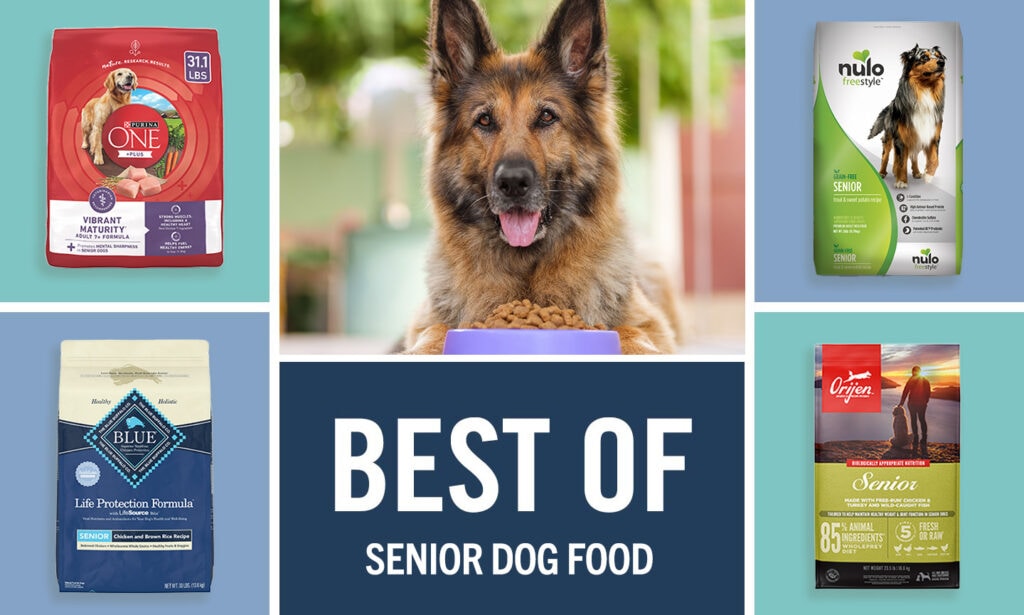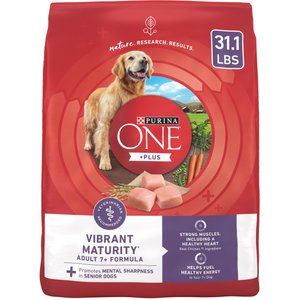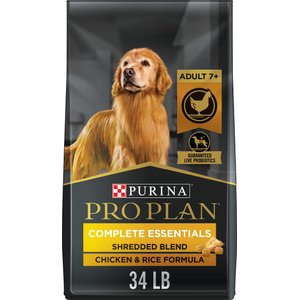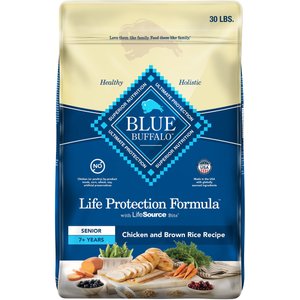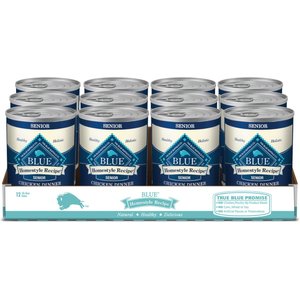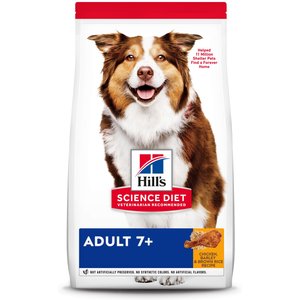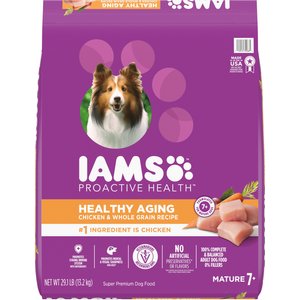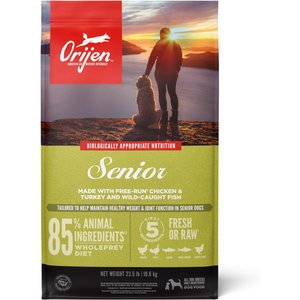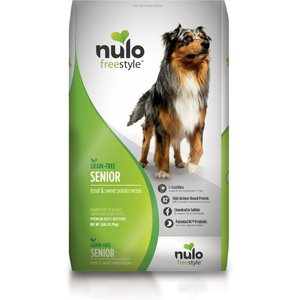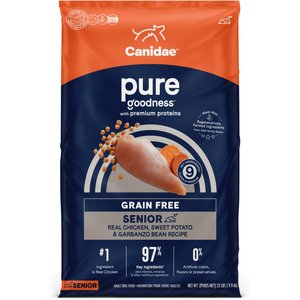Age, they say, is just a number—and that goes for our canine companions, too. With regular veterinary care, a healthy lifestyle and plenty of love, your senior dog can live their best life and make the most of their golden years.
One of the most important parts of a healthy lifestyle? Nutrition. Just like humans, dogs require a nutritious, high-quality diet to thrive, and their dietary needs change throughout the course of their life. If your four-legged friend is getting older and wiser, it’s time to reevaluate their diet and ensure they’re set up for success with the best senior dog food.
Why Do Older Dogs Need Senior Dog Food?
Some things about your dog will never change—for example, the way they look at you when you walk through the door, or the way their ears perk up when they hear the word “bacon.”
However, dietary needs change as our dogs age, explains Dr. Jessica Herman, DVM, a small-animal veterinarian based in Shelbyville, Kentucky.
“It is very important to feed your dog appropriately for [their] life stage,” says Dr. Herman. “Senior pets require a lower-calorie product that is high in fiber and has a higher-quality protein. Our aging pets do not exert the same amount of energy as they did when they were puppies, nor are they growing, and do not require high-calorie foods.”
At what age is a dog considered a “senior”? Different breeds age at different paces, so there’s no “magic number,” but the breakdown below provides general guidelines:
- Small breeds: 10-12 years old
- Medium breeds: 8-9 years old
- Large breeds and giant breeds: 6-7 years old
Many senior dog food formulas contain joint supplements. For this reason, Dr. Heather Frankfurt, DVM, a veterinarian at Hillside Veterinary Clinic in Dallas, Texas, advises having a conversation with your veterinarian about your dog’s changing dietary needs around age 7, and possibly even younger.
“I recommend all dogs over the age of 7 be on a joint supplement,” she says. “For larger breed dogs, I recommend them starting one at an even earlier age.”
What Is Senior Dog Food?
There’s no single senior dog food that’s best for all aging dogs. Instead, the best dog foods formulated for seniors typically contain a combination of the following features to promote wellness and address age-related conditions:
Fewer calories: Because older pets typically have lower activity levels and exert less energy, senior formulas usually contain fewer calories to help maintain a healthy weight, explains Dr. Frankfurt. In addition to dangerous health conditions such as heart disease and diabetes, excess weight can lead to arthritis in aging joints. “Obesity is something I take quite seriously, because of the toll it takes on our pets’ bodies,” she says. “Weight is a topic I discuss quite frequently.”
More fiber: Additional fiber helps promote gastrointestinal health and can be beneficial for pets with a sensitive stomach, while having the added benefit of helping pets feel fuller while consuming fewer calories.
More protein: Muscle mass tends to decrease with age, which is why many senior formulas contain increased amounts of animal protein. “Quality proteins help to maintain healthy muscle mass to keep mobility, and are important for elderly dogs,” says Dr. Herman.
Joint supplements: Senior formulas frequently contain supplements, including glucosamine and chondroitin, to support joint health.
Tastier flavors: Sometimes, it’s important to encourage a senior dog to consume more calories. Dogs undergoing treatment for medical conditions such as cancer may lose their appetite, so highly palatable formulas and meal-enhancing “toppers” can make mealtime more enticing.
Softer textures: Regular dental care can ensure that your dog maintains healthy, happy teeth as they age. However, for dogs who have had multiple tooth extractions or no longer have any teeth, wet formulas, which are softer than kibble, can make mealtimes more comfortable.
While the above-mentioned qualities make senior dog foods appropriate for many older pups, other dogs can continue to eat standard adult formulas, notes Dr. Herman. This differs from growing puppies, she adds, who must eat specially formulated puppy formulas to meet nutritional requirements.
How To Find the Best Senior Dog Food
If shopping for senior dog food feels overwhelming, you’re not alone—the ever-expanding pet market is flooded with options, and not all formulas are created equal. Consider the following when selecting a diet for your aging pooch:
Your Veterinarian’s Input
Before making any changes to your dog’s diet, have a conversation with your veterinarian about your individual dog’s needs and any age-related concerns you may have. Your vet should be able to recommend brands and formulas that suit your one-of-a-kind four-legged friend.
AAFCO Standards
The Association of American Feed Control Officials (AAFCO) is a private, non-profit organization that sets the nutritional standards for pet food. These AAFCO “nutrient profiles” detail the amount of macronutrients, like proteins and fats, and micronutrients, like vitamins and minerals, dogs need at different life stages. When selecting a product, look on the packaging for a statement that says it meets AAFCO standards. “Anyone can create a food product for pets, market it, then sell it without the food being analyzed for nutritional balance,” cautions Dr. Herman. By feeding a dog food that meets AAFCO standards, “you know that the product your dog is consuming has the correct nutrient content for his or her health.”
Ingredient List
On pet food packaging, ingredients are listed in descending order by weight—meaning the first couple ingredients make up the majority of the formula. Your best bud deserves the best quality ingredients, so make sure the list starts off with the good stuff (such as chicken, salmon or beef) and not cheap fillers (including soy, gluten and wheat).
Guaranteed Analysis
Perhaps even more important than the ingredient list is the package’s “guaranteed analysis,” which breaks down the food’s nutrient content. Per AAFCO standards, adult dog food must contain a minimum of 18 percent crude protein and 5.5 percent crude fat on a “dry matter basis” (a mathematical calculation that compensates for the varying amounts of water that pet foods contain) to meet nutritional needs. Note that AAFCO does not provide guidelines specifically for senior pets and these percentages can vary significantly, so it’s important to have a conversation with your veterinarian about your dog’s individual needs.
Kibble Size
Kibble size is always important to consider, but especially with senior dogs, who may have had tooth extractions. When selecting a food, ensure that the kibble is the appropriate size for your dog to comfortably chew. This can vary greatly among dog breeds.
Canned Food vs. Kibble
Some dogs thrive on dry kibble, while for others the taste and texture of wet food are preferable. If your dog is a picky eater or experiencing health issues that can cause decreased appetite, a canned formula may be a better option.
Supplements
If joint health is a concern, consider a recipe that includes supplements such as chondroitin and glucosamine, as well as omega-3 fatty acids, which have been shown to improve mobility in dogs with arthritis.
Humane and Sustainable Ingredients
If you’re an animal lover, you might consider choosing a formula made from humanely raised meats and sustainably caught seafood. While the health benefits for your own furry friend may be marginal, responsible farming and fishing practices improve the lives of farm animals and wildlife.
Best Senior Dog Foods
If you’re considering a senior-specific food for your distinguished dog, you’ve come to the right place. We rounded up the best-selling and top-rated senior dog food brands and recipes among Chewy customers to help you find a quality product that fits your pet’s changing needs. These are the best senior dog foods of 2024, according to senior dog parents like you.
-
1
Purina ONE SmartBlend Vibrant Maturity 7+ Formula Adult Premium Dry Dog Food, 31.1-lb... $50 on ChewyFREE 1-3 day shipping$50 on ChewyFREE 1-3 day shipping
-
2
Purina Pro Plan Adult 7+ Shredded Blend Chicken & Rice Formula Dry Dog Food, 34-lb ba... $72 on ChewyFREE 1-3 day shipping$72 on ChewyFREE 1-3 day shipping
-
3
Blue Buffalo Life Protection Formula Senior Chicken & Brown Rice Recipe Dry Dog Food,... $65 on ChewyFREE 1-3 day shipping$65 on ChewyFREE 1-3 day shipping
-
4
Blue Buffalo Homestyle Recipe Senior Chicken Dinner with Garden Vegetables Canned Dog... $35 on Chewy
-
5
Hill's Science Diet Adult 7+ Chicken Meal, Rice & Barley Recipe Dry Dog Food, 33-lb b... $79 on ChewyFREE 1-3 day shipping$79 on ChewyFREE 1-3 day shipping
-
Senior Dog Food
My senior dogs, both large and small, LOVE THIS FOOD. Size of the nuggets is perfect for all. They love it!!!!!
-
My old fella loves it and does very well on it! Chewy customer service is A+ too, I needed them for a coupon adjustment, nothing satisfaction-wise, and they are awesome!
-
Have been getting this before. Being an old dog (17 yrs), it has to taste good for him to eat it. Sometimes he will, sometimes he won't.
-
My dog loves this formula
After soing purina ONE for six months my dog got bored so we switched to PRO and so far he loves eating them.
-
Good quality
Our 10+ year old GSD was having many issues on her current food. After many weeks of a bland diet we gradually worked her back to kibble but switched to Pro Plan for seniors and she seems to be going well with it.
-
Seems to be helping
Les scratching and a little more energy. It's been about three weeks that our old boy has been eating the adult blend. He really likes it too, although he's a picky eater
-
Good Food
Both of my dogs do very well on this food. They maintain good health, not too heavy, and no gut issues.
-
Good switch
Have to Alaskan Malamutes. Now turning 9. Alfa was beginning to have stomach issues with his active large breed blue buffalo. Senior version ordered and switched with excellent results.
-
Always Blue Buffalo!
Started Jessie on Blue Buffalo Puppy Chicken and Rice. From there to the Adult formula and now, at age 12, she's on the Senior version. She has never tired of it and always looks forward to meal time!
-
Chewy Health for my Most Beloved Companion
Chewy products are importantly tome for the continued health of my most important companion. Chewy’s recommendation and follow up supplying has been important in keeping my pet ( Lory )on a healthy and tasty diet.
-
Always Dependable
Our senior 15+year dachshund loves his senior dinner mixed with his kibble. CHEWY has made sure it’s always here on time just like his meals are.
-
Dogs Love This Food!
Dogs are getting older and one of them had a couple teeth pulled so we do their main meal as this Senior wet food and just put a little kibble with it. My dogs go crazy for it every day!
-
Great
It’s the only dog food that doesn’t make my senior dog itchy on. Definitely worth the money! Will continue to buy.
-
Bailee has been eating Hills Science Diet since she was a pup. The food has never given her a problem.
-
Hills is the best!
Great service and quality food and options!! My dog loves the Hills products. He is really healthy at 9 years old!!
-
Iams senior
My dogs stopped eating their normal senior food. I purchased the IAMS and they think it's a treat. Time will tell if it has better health benefits.
-
Boodles loves Chewy
Years ago someone from Chewy requested a photo of Boodles - painted her picture AND sent it to me. Still have it displayed - love you guys & your products AND service.
-
Quick and easy
The order of two large bags of Iams dogfood came very quickly. It's nice to have it delivered since it's heavy. My dog likes Iams.
-
Good products
But I have invested a lot of $$ in your stock and presently down 60k , in the next year will cancel future orders if you can’t start to turn a profit
-
Some GOOD food
Even my Holistic vet had me take my girl off Science Diet formula, which i put her on due to some digestive issues, and put her back on this.
-
Weight loss
So far so good . Has definitely help with weight loss . I do add water to soften to hard for my senior .
-
Yummy and Healthy
Found this most highly rated on Dog Food Advisor. Four years later my pup loves it. Must be concentrated because she needs less than previous brands to maintain her weight.
-
Healthy
My 12 year old likes this food. The kibble is not too big or too small. My senior had sporadic diarrhea on another dry kibble. The Nulo actually stopped that.
-
Amber’s favorite
I love Nulo Senior for Amber. It makes our lives easier since the quality kibble maintains her weight, energy and digestion. There are so many food options, I’m happy we found a winner.
-
Healthy and yummy
My nine-year old St. Bernard/herding mix absolutely loves this food. He was protesting the previous senior dog healthy weight food we had him on. When that got recalled, we decided to try this. He’s absolutely loving meal times again and maintaining a healthy weight and joints! Only downside is the cost.
-
Canidae Dog Food
My dog is highly allergic to many foods. This dog food seems to agree with her and she enjoys it.
-
Our GSD really likes this dog food
We bought three small bags of dog food to see what our GSD prefers as we transition her to a Senior diet. She clearly prefers this dog food. She is not a finicky eater but certainly shows preferences. Not only does she like it but it agrees with her and she is doing very well with it.
Senior Dog Food FAQs
Q: At what age is a dog considered a senior?
A: Dogs age at different rates depending on their size and breed, so there’s no “magic number” to denote the beginning of the senior years. However, senior dog foods are typically formulated for canines 7+ years old. If your dog is a large or giant breed, you may want to consider diet-related changes sooner; conversely, smaller dogs may wait longer. Your veterinarian can help you determine when your one-of-a-kind pup is approaching their golden years.
Q: How do you transition dog food?
A: When changing foods, it’s important to slowly introduce the new formula to avoid gastrointestinal problems. Slow and steady is the name of the game: Begin by mixing a bit of the new food into your pet’s current food, for a ratio of 25 percent new food to 75 percent current food. After two to three days, if your pet isn’t experiencing any adverse effects, increase the ratio to 50/50. Increase the ratio to 75/25 after another two to three days, and then finally fully transition to the new formula. For step-by-step tips and troubleshooting, consult our veterinarian-written guide to switching foods.
Q: How often should I feed my senior dog?
A: Feeding schedules vary from pet to pet. However, for most dogs, twice a day is optimal, says Dr. Frankfurt. Leaving a full bowl of food for all-day grazing is almost never a good idea, she adds. “That is a surefire way to end up with an overweight animal,” she advises. If your pet seems to overeat because they simply eat the food too fast, she recommends purchasing a slow-feeder bowl that has obstructions built into.
Q: What food is good for senior dogs with digestive problems?
A: If your dog is experiencing digestive problems, first consult your veterinarian to determine the underlying cause. As the digestive tract ages, many seniors experience issues such as constipation and diarrhea, which may be alleviated with a high-fiber dog food.
The Bottom Line
Caring for a senior dog requires a little extra effort, but is rewarded with a lot of extra love. Thanks to advances in nutrition and veterinary care—as well as good old-fashioned TLC!—our four-legged friends can enjoy happier, healthier golden years by our side. Ready to make the most of your days together? Check out these 12 expert tips for helping your senior dog live their best doggone life!
Expert input provided by Dr. Jessica Herman, DVM, a small-animal veterinarian based in Shelbyville, Kentucky, and Dr. Heather Frankfurt, DVM, a veterinarian at Hillside Veterinary Clinic in Dallas, Texas.
Get more advice for caring for senior dogs:
Share:
